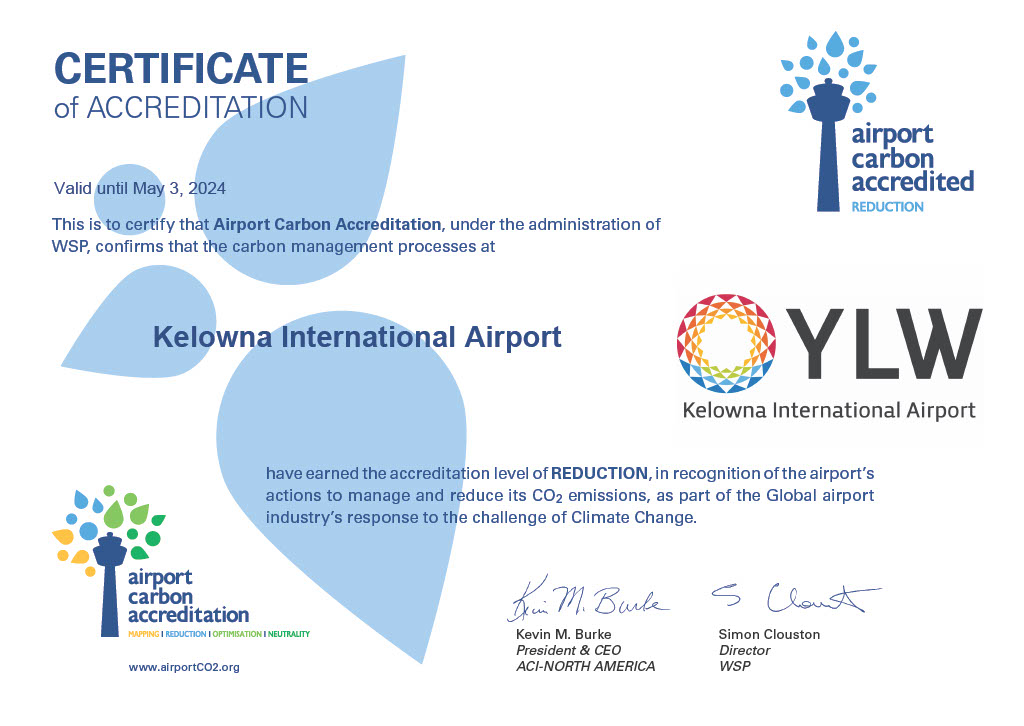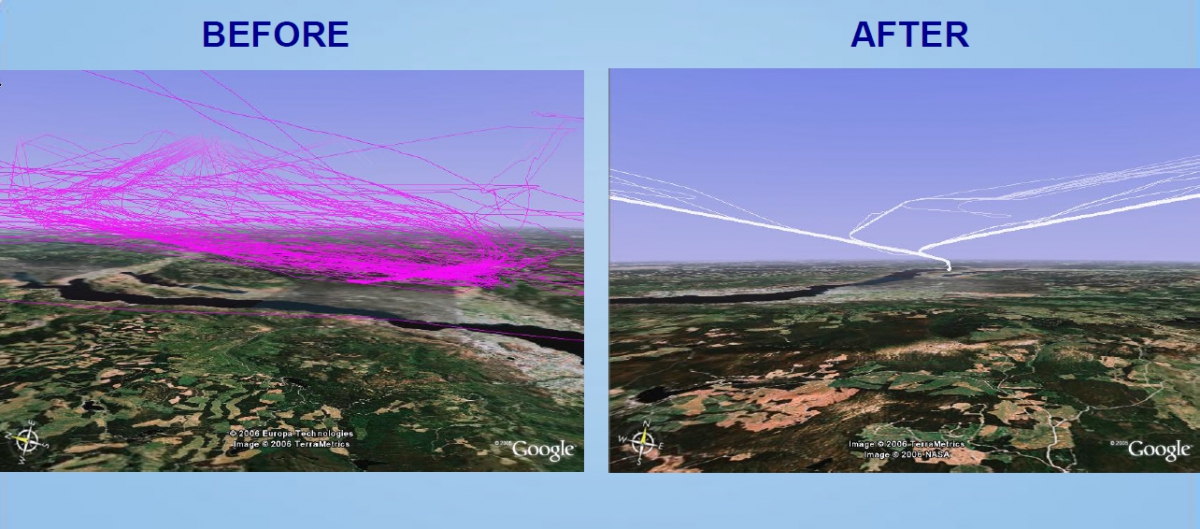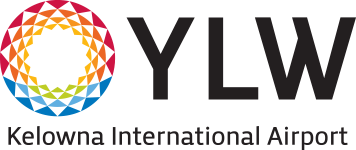Environment
Kelowna International Airport (YLW) is committed to the protection of the environment and to continually improving our environmental performance, which allows YLW to sustainably grow and serve the region.
In 2018, YLW became carbon accredited through Airports Council International (ACI) and its Carbon Accreditation program. As part of the ongoing program, YLW was awarded Level 2 Carbon Accreditation from ACI in June 2022, recognizing our dedicated efforts to measure and reduce carbon emissions. This accreditation remains in effect to date. We are actively developing a comprehensive plan to significantly reduce our energy consumption and attain Level 3 Carbon Accreditation by 2026, as part of our commitment to achieving carbon neutrality by 2030.
GHG Emission Reduction Policy
YLW is always working on new plans to help reach our environmental goals. Read about the latest initiatives below:
- Upgraded small engine tools to electric to reduce fuel usage.
- Installed electric pre-conditioned air units at Op Stand 3 to displace aircraft auxiliary power unit (APU) use or diesel ground power units to run aircraft heating and cooling when parked.
- Upgraded Apron 3 floodlights and Apron 1 inbound baggage area lighting to LED, which is expected to result in a 60% reduction in power consumption.
- Renewable diesel trial and introduction for airport and tenant use.
- Installed an EV charging station in the Combined Operations Building to facilitate ordered electric truck.
- Replaced lighting with LED on terminal building front curb, atrium, upper mezzanine and several offices and installed interior and exterior occupancy sensors for energy savings.
- Replaced 19,000 square feet of the Airside Corridor rooftop with high-insulation rated materials for increased energy efficiency.
- Shaded the Airport Terminal Building rotunda and Admin office windows with blocking film to reduce the amount of energy required to cool the building.
- Introduced back-of-house composting and compost bins in public areas of the terminal building to reduce landfill waste.
The Kelowna International Airport (YLW) has been actively measuring and managing environmental impacts since the early 1990s. The airport has made great strides towards reducing emissions and recognizes the importance of further action to reach net zero emissions. YLW achieved Airport Carbon Accreditation (ACA) Level 1 in 2016, which represents its baseline year. In 2022, YLW set a greenhouse gas (GHG) reduction target to reduce Scope 1 & 2 (direct control) emission sources as defined by the Ministry of Environment and Climate Change Strategy and received Level 2 Carbon Accreditation in June. YLW has since renewed the Level 2 Certification and is currently working towards Level 3 Certification by 2026.
2030 Target:
YLW is committed to reduce Scope 1 & 2 emissions by 50% per passenger and achieve carbon neutrality by 2030, with a plan to achieve net zero or net negative by 2040. Our 2030 target equates to an average of 3.57% annual emissions reduction per passenger over 2016 levels. YLW is committed to actively working with YLW Campus Partners on reducing their carbon footprint through innovations in infrastructure and policies.

In June 2016, YLW completed the groundside incandescent light project. The project, which was a collaboration between YLW and Bouygues Energies and Services, involved changing 241 parking lot and road lights from High Pressure Sodium to LED. In 2019, more lighting conversion replaced lights in parking areas, on walkways and in the airfield.
The old incandescent fixtures drew approx. 11 amps. per unit, while the new units draw a mere 0.5 amps each, reducing YLW’s overall energy consumption by 141,000 k.W.h. per year! It will also potentially save 104 metric tonnes of CO2 annually. From 2016 - 2019, these LED retrofits have saved ~650,000 kWh, which is equivalent to reducing 461 metric tonnes of (CO2) emissions. This amount of energy is equivalent to powering the energy use of 58 homes per year.
The new lighting fixtures provide better lighting by providing a higher, uniform lighting output to increase safety and security of people and vehicles.
In 2023, YLW begun phase one of the airport terminal building lighting upgrade which has converted more lights to LED, including those on the taxiway, apron, frontage curb and terminal building lights. Completed actions in 2023 include upgraded Apron 3 and Baggage Triangle lighting to LED lighting, which is expected to result in a 60% reduction in power consumption upgrade.
YLW has plans to start phase two of the airport terminal building lighting upgrade by converting to LED lights in the exterior, rotunda and concourse. In 2025, conversion of incandescent to LED runway edgelights and approach lights, airfield guidance signs (fluorescent). The airfield regulator will also be upgraded to maximize the energy reductions.
In 2019, four new electric vehicle charging stations were installed at the Cell Phone Waiting Area, located off Airport Way.
Two fast charging stations can charge a compact electric vehicle in about a half an hour, as compared to a Level-2 stations that requires about three to four hours.
In 2023, YLW installed an EV charging station in the Combined Operations Building. The charging station will support a new fully electric runway inspection vehicle to be introduced by 2024.
Did you know that Mill Creek, part of the serene Mill Creek Regional Park, runs right under our runway? This vital wildlife corridor is essential for maintaining the biodiversity and health of the surrounding environment, allowing various species to move freely and thrive.
Preserving Mill Creek is crucial to prevent contamination that could harm the ecosystem. In 2020, YLW took a significant step by constructing a new oil-water separator. This system effectively prevents oil and silt from entering the creek, ensuring that the water remains clean and the habitat is protected.
By safeguarding Mill Creek, we help maintain the natural beauty and biodiversity of the area, ensuring it remains a vibrant and healthy ecosystem for future generations.
We pride ourselves on being an environmentally friendly organization that betters our surrounding community. We strive to contribute toward environmental protection and sustainable development.
That’s why YLW has partnered with Bouygues Energies and Services Canada (Bouygues) to use only the highest standards of cleaning supplies, in the safest environment possible. In line with Bouygues’ commitments made in their corporate Environmental and Sustainable Procurement policies, we are proud to use green certified cleaning products at the airport. These cleaning products are all Green Seal or EcoLogo certified.
In June 2015, after a careful review of our current practices, Bouygues selected Diversey as the preferred supplier of an improved line of green certified products. The new line of products consists of a bathroom cleaner, a multi-purpose and glass cleaner, a disinfectant a cream cleanser and a heavy-duty floor cleaner.
YLW wants you to feel safe in all aspects during your time at the airport. With this new line of green certified supplies, you can rest assured that you and your family are in contact with only the safest and most environmentally friendly cleaning products.
YLW has developed into one of the fastest growing airports in the country. The airport is a key transportation hub for the general aviation industry including flight schools, private aircrafts, helicopters, as well as charter and medical flights.
Currently aircraft flying into YLW use a primary public navigation approach procedure based using radio signals. Technology and regulations are changing. In order to maintain the current accessibility into YLW, NAVCANADA is incorporating new satellite technology into our navigation system (RNAV). Following this will be the development of a public Required Navigation Performance Authorization Required (RNP-AR) procedure which will be a benefit to this airport and the aircraft flying into YLW due to our mountainous terrain.
Putting RNP-AR procedures in place provide many benefits including safety, environmental and noise reduction. Implementing RNP-AR in Canada is part of Canada’s Action Plan to Reduce Greenhouse Gas Emissions from Aviation. WestJet invested in this technology for their aircraft and they have been using RNP-AR approaches for several years with great success. In 2013 they found their YLW RNP-AR operations saved 310,000 L of fuel and 396,000 m3 CO2. By late fall 2015 new RNP-AR procedures will be in place that will enable other operators to use the RNP-AR as they upgrade their aircraft capabilities and technologies.
In January 2024 an additional RNP-AR approach will be introduced at YLW. To learn more, visit ylw.kelowna.ca/flightpaths.

YLW is sensitive to the noise concerns voiced by citizens of the Okanagan.
In a continuing effort to minimize the effect of aircraft related noise, the airport has a very proactive noise management program. Each noise concern received by the Airport is investigated, and brought to the attention of those responsible, and in some cases, regulatory authorities. In addition to this, the Airport meets with Airport tenants, regulatory bodies and airlines serving Kelowna on an annual basis to discuss noise concerns and mitigation plans. Through this approach of investigation and education, we hope to minimize the impact of noise on the local residents, and prevent recurring problems.
Your comments are appreciated and are taken seriously; however, only concerns with contact information will be registered and replied to. A representative from the Airport will contact you to discuss your concern.
Aviation complaints away from Kelowna Airport
For aircraft noise or low flying aircraft concerns that occur outside the 5km radius of YLW (i.e. over Okanagan Lake, the downtown centre or throughout the Okanagan Valley), please contact Transport Canada:
Requests to: aviation.pac@tc.gc.ca
Questions to: 1-800-305-2059
For more information see Civil Aviation Communications Centre.
YLW has five water bottle refill stations throughout the terminal building that have saved over 455,192 single-use plastic bottles as of December 2023.
YLW introduced compost bins in all employee areas of the airport in June of 2023 and introduced compost bins in our terminal in December of 2023 to help reduce landfill waste.


